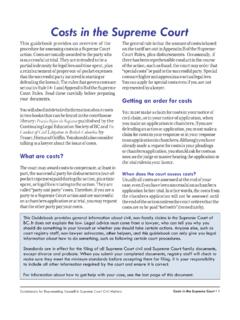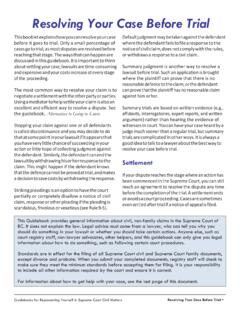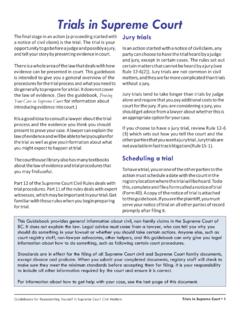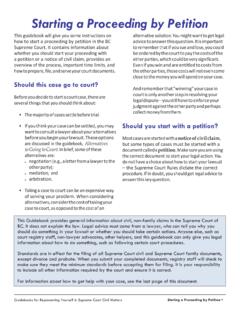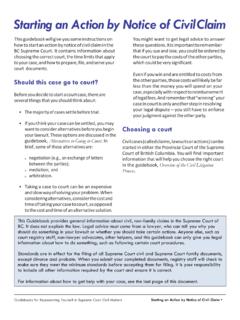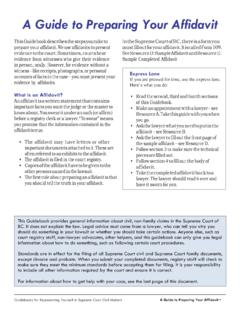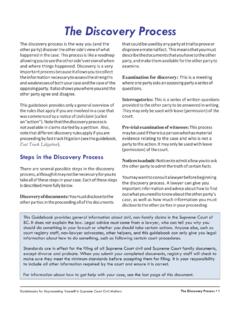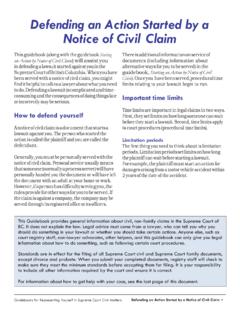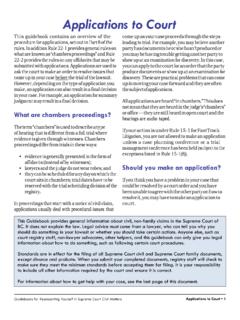Transcription of Enforcing Court Orders - supremecourtbc.ca
1 Enforcing Court Orders Enforcing an order means making sure that what the Court ordered is done, or executed. Usually you want to collect money that is owing to you. In general, when a judge makes an order , the parties must do what the judge has decided. There are different ways to enforce an order . How to enforce an order depends on what the judge ordered, and whether the other party is able or willing to comply. You may need to return to Court to get some direction from a judge on how to enforce your order and collect the money that is owing to you the Court registry staff cannot help, and you cannot hire a Court sheriff to help collect the money that is owed to you under the Court order . It would be a good idea to talk to a lawyer about how to enforce your Court order , as the laws about debt collection procedures are not easy to understand.
2 In addition to enforcement under the Rules of Court , there are enforcement options and more information under the Court order Enforcement Act. There are books in the courthouse library to help with Enforcing Orders : McLachlin & Taylor s British Columbia Practice by Frederick Irvine, Annotated British Columbia Court order Enforcement Act by William Holden and John Fiddick, and Practice Before the Registrar by the Continuing Legal Education Society of BC. There are also books on Enforcing payment Orders : British Columbia Creditor s Remedies: An Annotated Guide by the Continuing Legal Education Society of BC, and British Columbia Debtor-Creditor Law and Precedents by Lyman Robinson. Getting your judgment paid You have now completed your Court case, and the judge or master has made an order in your favour.
3 The first thing you should do is draft an order , setting out the decision of the judge or master who heard your case. The guidebook, Drafting Orders , gives you information about how to do this. If the judge ordered the other party to pay you money, including Court costs, you are the judgment creditor and the other party is the judgment debtor. At this point, you should seriously consider the likelihood of getting your judgment paid. Just because you have a judgment in your favour, it does not mean that the judgment debtor will deliver a cheque to you now, or ever. The judgment debtor may be unable or unwilling to pay you. If the judgment debtor is unemployed and does not own any assets, there is not much chance that you will recover what is owed to you.
4 Guidebooks for Representing Yourself in Supreme Court Civil Matters Enforcing Court Orders 1 This Guidebook provides general information about civil, non-family claims in the Supreme Court of BC. It does not explain the law. Legal advice must come from a lawyer, who can tell you why you should do something in your lawsuit or whether you should take certain actions. Anyone else, such as Court registry staff, non-lawyer advocates, other helpers, and this guidebook can only give you legal information about how to do something, such as following certain Court procedures. Standards are in effect for the filing of all Supreme Court civil and Supreme Court family documents, except divorce and probate.
5 When you submit your completed documents, registry staff will check to make sure they meet the minimum standards before accepting them for filing. It is your responsibility to include all other information required by the Court and ensure it is correct. For information about how to get help with your case, see the last page of this document. The information in this guidebook sets out a few options that are available to you. Think about them carefully before proceeding to collect your judgment. This is a good time to talk to a lawyer about your options. For some money judgments, a limitation period of ten years starts to run from the date of judgment, so you will want to keep that in mind as you are considering your options.
6 Ask the debtor for payment First, take your order to the Court registry for filing. The Court registry staff will return your order to you, stamped and ready to be enforced. How you enforce it depends on what remedy the judge has ordered, and what assets or income the other party has. The Court registry staff cannot help you enforce your order . The first step in Enforcing an order is to deliver the stamped order on the person(s) affected by the order and ask for payment. For help with service, see the guidebook, Starting an Action by Notice of Civil Claim. Set a deadline for payment, and give the person reasonable time to comply. In some cases, you must prove that this person has not complied with the order (Rule 13-2(13)(a)(ii)).
7 The judgment debtor may pay you the money that the Court ordered. In that case, the judgment debtor can ask for proof of payment. You must complete Form 55, file it with the registry, and serve a filed copy on the judgment debtor. If the debtor doesn t pay you immediately, you will have to take steps to enforce your Court order . You have 10 years before the order expires, but it is a good idea to try to collect the debt as soon as possible. If the debtor does not pay You have a few options if the debtor does not pay. The most common options are: Find out the debtor s financial situation by: o conducting an examination in aid of execution hearing; or o arranging a subpoena to debtor hearing; Garnish the debtor s wages or bank account; Seize and sell the debtor s assets; or Register the judgment against the debtor s land.
8 These options are described below. Find out the debtor s financial situation If the judgment debtor does not pay the money owing to you, there are two procedures under the Rules of Court that require the judgment debtor to answer questions, under oath, about his or her financial situation and ability to pay the debt. In addition to giving you an opportunity to question the debtor about his or her financial situation, it also provides an opportunity to discuss payment of the debt, thereby avoiding further costs and delay. There are two ways that you can force the judgment debtor to answer questions under oath: you can conduct an examination in aid of execution, which helps you find out about the debtor s assets and income; or you can issue a subpoena to debtor to have a judge or a registrar examine the debtor and make an order about how the debt will be paid.
9 After you learn about the debtor s financial situation, you can take steps to collect the money owing to you by garnishment or other means. Remember that a judgment debtor who has no assets and no income might not be able to pay the money that is owed to you. Examination in aid of execution An examination in aid of execution is an examination for discovery under oath before a Court reporter (see Rule 13-4(7) and Rule 7-2). The 2 Enforcing Court Orders Guidebooks for Representing Yourself in Supreme Court Civil Matters purpose is to find out about the debtor s income, assets, and plans to pay the judgment. To conduct an examination, fill out Form and serve it on the party to be examined.
10 If the debtor is a company, you can name the person that you want to examine, such as a director, officer, or employee of the company. If the debtor is a partnership, you can name any partner to be examined. Rule 13-4(10) tells you how to serve the appointment for examination in aid of execution. If the person to be examined is a party of record and is represented by a lawyer, you must serve an appointment in Form on the lawyer along with witness fees for the person to be examined. (You can find out the correct amount of witness fees in Schedule 3 of Appendix C to the Rules.) If the person you want to examine is not represented by a lawyer, serve the appointment on that person, along with witness fees.
